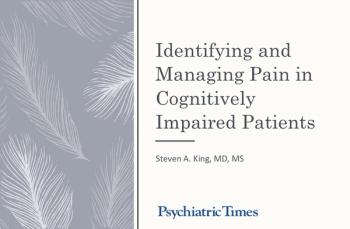
Understanding and developing treatments for the cardiovascular system and how it relates to psychosocial distress and the nervous system are keys to the future of psychiatry.

Understanding and developing treatments for the cardiovascular system and how it relates to psychosocial distress and the nervous system are keys to the future of psychiatry.

As physicians first, psychiatrists must consider the big picture, without reflexive and thoughtless prescriptions for psychotropics—even if many, including medical professionals, assume that is all we do.

How to recognize postural orthostatic tachycardia syndrome—and treat it.

Michael F. Myers, MD, discusses issues of gender and sexuality, both today and in recent psychiatric history.

Preliminary studies suggest that adjuvant treatment with a statin may be beneficial for patients who are also prescribed psychotropic drugs for depression and schizophrenia.

Clinicians, families, and patients all report frustration with SSRD treatment in hospitals. It’s time to improve it.

Physical activity and exercise are recognized as fundamental tools for reducing the impact of chronic diseases, including depression.

First conceptualized over a century ago, conversion disorder continues to present a challenge to clinicians.

In the early days of the pandemic, there was debate about whether clinical services for patients with psychiatric illness were “essential.” The evolution of psychiatric consultation-liaison services to medically hospitalized patients was no less complex.

A recent study presents new findings on the connection between psychiatric disorders and Lyme.

With most chronic pain conditions, the exact pathology is uncertain. In such cases, psychiatrists may be called to assess for illness beyond medical diagnosis.

In comparison to the classic presentation of schizophrenia, ANMDARE features a later age of onset, female predominance, visual hallucinations, relative lack of cognitive disorganization, and a lack of an extended prodromal period.

The next several years will present challenges and opportunities for psycho-oncology to improve care for patients.

There are myriad nuanced clinical approaches to cancer treatment, and psychosocial factors are no less complex.

An added component of cancer treatment is discovering what is most meaningful in the patient’s life and using that to buoy them during difficult moments. That, in a nutshell, is the psychiatrist's role.

Here: A summary of indicators for stress and anxiety in patients undergoing transplantation, and why it is important for psychiatrists to be aware of these factors.

When the patient has significant comorbid psychiatric problems, high risk of suicide, and Huntington disease, the role of clinician spills over into patient advocate in a complex medical system.

Despite advances in clinical care for patients with cancer, distress and depression continue to haunt patients. These fast facts will help you better understand and care for patients with cancer.

Distress and depression are associated with adverse outcomes in patients with cancer, including reduced quality of life, longer rehabilitation time, poor adherence to treatment, and worse survival.

For the millions of patients whose pain is being treated with opioids, mind-body interventions are proving to be important considerations to ease suffering.

How do you determine whether pain is present and its severity as well as how it responds to treatment in patients who are cognitively impaired? Some answers to these questions.

How can clinicians determine the presence of pain in cognitively impaired patients? And how do you know the medication is working if your patient can’t tell you?

The mixed bag of emotions described here should be familiar to any clinician, especially to a psychiatrist.

Three studies highlight how important it is that when physicians prescribe opioids there can be significant and even potentially fatal consequences for the family members of those for whom they are being prescribed.

In this Special Report we offer articles that address the interplay of psychiatric and infectious disease.